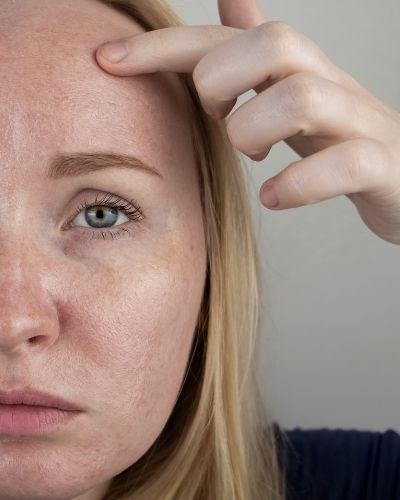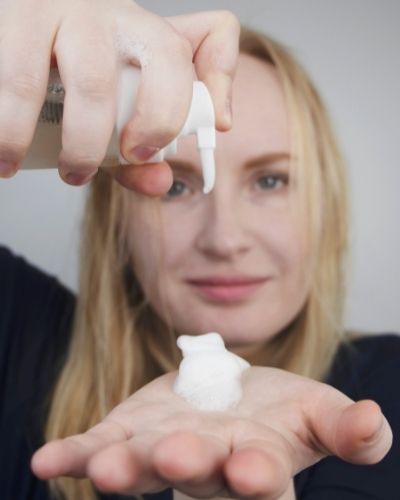Right off the bat, I want to say that Accutane cannot fix oily skin because oily skin doesn’t need fixing.
Oily skin isn’t a condition like acne is (although the two can often go together); therefore, it doesn’t need fixing.
What oily skin needs is maintenance with a good skincare routine consisting of products that are suitable for your skin.
But if you want to know whether Accutane can make the skin less oily, the answer is yes. Accutane will definitely dry out the skin, which brings up a plethora of new issues, which I will talk about below.
So, let’s start from the beginning and understand Accutane, why it is given to people, what it does to the skin, and how you can maintain oily skin without considering this medication.

What is Accutane?
Accutane is the brand name for the medication known as isotretinoin, an oral medication used to treat severe acne on the face and body.
It is also commonly prescribed to people whose acne has resisted previous treatments, such as benzoyl peroxide, adapalene, and antibiotics, as well as those dealing with severe acne in larger areas such as the chest and back.
The exact mechanism of action is unknown; however, it’s been observed that Accutane inhibits the function of the oil-producing glands by reducing the gland’s size.
Once the gland’s size is reduced, the gland will then produce less oil. This tells us that Accutane can dry out the skin and make it less oily.
This can help acne since excess oil is essentially food for the acne-causing bacteria that live on the skin; lack of it will cause the bacteria to become starved, thus minimizing proliferation and eventually minimizing acne, too.
However, despite its efficacy, Accutane is known to come with some unpleasant side effects, the most common ones including dry skin, chapped lips, and dry eyes.
Sometimes, people that are going through a long course of Accutane can experience joint pain, headaches, and hair loss, but these are rarer side effects that don’t happen to most people.
But despite that, it’s important to note that one of the main reasons for these side effects is the lack of our natural oil because we need the oil produced by our sebaceous glands to lubricate our skin, joints, hair, and eyes.
Without it, everything will dry out and start to itch, sting, and lead to inflammation and discomfort.
Another important thing to note about Accutane is that it’s also a teratogen, meaning it can cause birth defects in pregnant women.
For this reason, women who are taking Accutane must use two forms of contraception and take regular pregnancy tests to make sure they’re not pregnant while undergoing the medication and/or a couple of months after stopping it for precaution.
RELATED: Can You Smoke While on Accutane?
Can You Get Rid of Oily Skin?

No, you can’t get rid of oily skin because oily skin isn’t a condition.
It’s a skin type that usually starts becoming more prominent around puberty (or even before, depending on the person) and lasts up until the late forties or fifties (again, depending on the person, as it’s different for everyone.)
However, even if you could get rid of oily skin, you probably wouldn’t want to because oily skin actually comes with quite a few advantages.
Therefore, let me mention a few pros of having this skin type, as these will help you feel better about it.
Slower Aging
First of all, people with oily skin tend to age better and have fewer wrinkles and fine lines than those with dry skin.
This is because our natural oil lubricates the skin well enough and keeps it plump, which means that the skin won’t experience as much friction through facial movement.
This also means that the skin is less likely to develop microtears, which then can lead to wrinkles.
Protection From External Pathogens
Our natural oil also protects us from external pathogens, such as bacteria and viruses, due to containing fatty acids such as cis-6-hexadecenoic acid (commonly known as sapienic acid) that have the ability to debilitate potentially harmful bacteria at several levels.
Natural UV Protection
While going out in the strong sun without wearing sunscreen is never a good idea, knowing that you have a little bit of natural protection provided by your oil is still a comforting thought.
Oily skin provides some natural sun protection, as sebum comprises around 90% lipids, or fat molecules, that lock in moisture and have mild UV protective properties.
Antioxidant Protection
And lastly, our natural oil is also rich in antioxidants, which help protect the skin from free radical damage.
Free radicals are unstable molecules found in the environment that can damage cells and lead to premature aging.
Some of the antioxidants found in sebum that fight against these harmful molecules include squalene, vitamin E, and Coenzyme Q10, which are also ingredients commonly found in expensive serums, but your body provides them for free.
RELATED: Best Antioxidant Facial Serums
How to Take Care of Your Oily Skin?

Since we’ve determined that you can’t get rid of oily skin because your natural oil performs many important functions, let’s talk about how to properly care for your skin and maintain its health.
Regular Cleansing
To keep your face fresh and clean, you should consider using a cleanser at least once a day (in the evening.)
If your skin becomes way too oily, you can use a little bit of cleanser in the morning but don’t overdo it because this could potentially dehydrate the skin and make it produce more oil to compensate for the dryness.
RELATED: Best Cleansers For Acne-Prone Skin
Exfoliation
Exfoliation is a part of any good skincare regimen, and oily skin tends to benefit from exfoliating products that contain ingredients such as salicylic acid, glycolic acid, or mandelic acid.
Exfoliating two-three times a week is good enough because this will give you a beautiful glow and a more uniform complexion alongside tackling issues such as acne and excessive oiliness.
Retinoids
Retinoids are another excellent option for someone with oily skin as besides their anti-aging benefits; they also help get rid of acne and minimize enlarged pores.
There are quite a few retinoids available on the market, but adapalene (over-the-counter) and tretinoin (prescription-only) tend to give the best results.
Hydrating Serums and Moisturizers
While you might think that hydrating serums and moisturizers are the last things you need if you have oily skin, you’d be surprised to know that these products can actually help regulate sebum production.
Look for hydrating serums and moisturizers that are oil-free, non-comedogenic, and have a light texture.
RELATED: Best Niacinamide Serums Under $30
Sunscreen
Last but not least, don’t forget to wear sunscreen every day because, as I already mentioned above, the UV rays can damage your skin by degrading the skin cells and breaking down essential skin-supporting proteins such as collagen and elastin, and you want to avoid that at all costs.
A good sunscreen should have an SPF of 30 or higher and provide both UVA and UVB protection.
RELATED: Best Powder Sunscreens With High SPF
Closing Thoughts
Oily skin is often seen as a curse, but it doesn’t have to be that way.
Now that you know all the benefits of having oily skin, you can start taking proper care of your complexion and enjoy all the advantages that come with it.

My name is Simone and I am a certified skin specialist. I created this website to teach my readers how to take great care of their skin and I also like to occasionally share my honest opinions on skincare products I’ve tried. You can learn more about me here.
